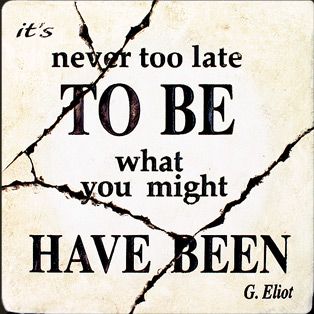 Success is how you define it and mediocrity is one of my biggest fears. We all have different definitions of what success means to us in all aspects of our lives. I have some big ideas about the contribution I need to make before I leave this planet and the thought of not living up to those ideals terrifies me.
Success is how you define it and mediocrity is one of my biggest fears. We all have different definitions of what success means to us in all aspects of our lives. I have some big ideas about the contribution I need to make before I leave this planet and the thought of not living up to those ideals terrifies me.
The challenge is that “pretty good” is a reasonably easy target while “extraordinary” requires a completely different level of choices and commitment. And those actions have to exist in a life where there’s a job, family, friends, pets, house chores, hobbies, etc., etc. No surprise that comfortable distractions are a lot more attractive than committed actions.
As one who enjoys anything that will help me be at my best, I have a love/hate approach to personal development books. Much of it is syrupy feel-good nonsense, but some is very legit and useful. The problem is, even the good stuff is usually just repackaged ideas that have been around for the last 50-100+ years.
Some very large names in the field have done quite well rehashing ideas from Napoleon Hill’s Think and Grow Rich, Dale Carnegie’s How to Win Friends and Influence People, Norman Vincent Peal’s The Power of Positive Thinking, or Earl Nightingale’s The Strangest Secret. Tony Robbins summarized the wisdom of the ages best with his Ultimate Success Formula which goes something like: 1) Know what you want; 2) Know why you want it; 3) Take massive action; 4) Notice what’s working or not; and 5) Change your approach until you get your results. Simple, straightforward, and intuitive, but perhaps not sufficient. No one who’s made it to adulthood should be surprised by any of those steps, yet most of us are still stuck in ordinary.
The title for this review comes from the back cover of Dan Waldschmidt’s (@danwaldo) book EDGY Conversations: Get Beyond the Nonsense in Your Life and Do What Really Matters. He takes a different approach and asserts that goals, hard work, and tenacity are not enough because we are our own worst roadblock. Our beliefs and behaviors, excuses and justifications keep us in comfortable mediocrity. Truly rising above, standing out, and making a difference requires a completely different level of commitment, thought, belief, and action.
“Because success isn’t about knowing more, It’s about being more… The reality is that you already know what to do… The real question is, what will you do about it? Who will you choose to become.” – Dan Waldschmidt
Contrary to what the infomercial experts and hope pushers tell us, Dan wholeheartedly acknowledges that the whole being extraordinary thing is really freakin’ hard. Knowing what to do is easy; actually doing it is miserably difficult. The movies make it look simple, right? A three minute montage with some upbeat music in the background and suddenly the underdog is a martial arts winning, freestyle rapping, marathon running, dance champion with a Harvard degree and a thriving side business bootstrapped into a global powerhouse. But in real life it comes down to who we are choosing to be and the decisions we are making every day.
The author reminds us that outrageous success comes as much from what we say “no” to as it does what we say “yes” to. And in our instant gratification you-deserve-to-have-it-all marketing saturated world, saying “no” is weird. And painful. And miserable. And necessary.
This book is the author’s approach to breaking past ordinary. His formula is based on the acronym EDGY: Extreme behavior, Disciplined activity, Giving mindset, and Y(h)uman strategy. The last letter’s a stretch, but the writing is spot on. Actually, I could have shortened this review to: If you like his blog, buy the book.
If you’re unfamiliar with his blog, check it out here. Dan’s not into business or life as usual and has a contrarian approach written in direct one and two sentence paragraphs with brilliant turn of phrase and a deep belief that the reader has it in them to be amazing. If you don’t like his blog, you really won’t like his book. If you like the blog, you’ll find he brings powerful examples and a very human vulnerability beyond his normal writing to the book.
So here’s the ugly secret truth: life is so much easier when you have excuses or others to blame for not creating the results you want. Sure, you don’t accomplish what you want, but you get to be comfortable in your mediocrity. This book is aimed at stripping those illusions away and challenging you to set that comfort aside to pursue your intentions with the ferocious, relentless tenacity of a Spartan warrior. It’s not wondering what to do, it’s not creating a 10 point success checklist, it’s being the person you need to be.
All day, every day.


 Success is how you define it and mediocrity is one of my biggest fears. We all have different definitions of what success means to us in all aspects of our lives. I have some big ideas about the contribution I need to make before I leave this planet and the thought of not living up to those ideals terrifies me.
Success is how you define it and mediocrity is one of my biggest fears. We all have different definitions of what success means to us in all aspects of our lives. I have some big ideas about the contribution I need to make before I leave this planet and the thought of not living up to those ideals terrifies me.